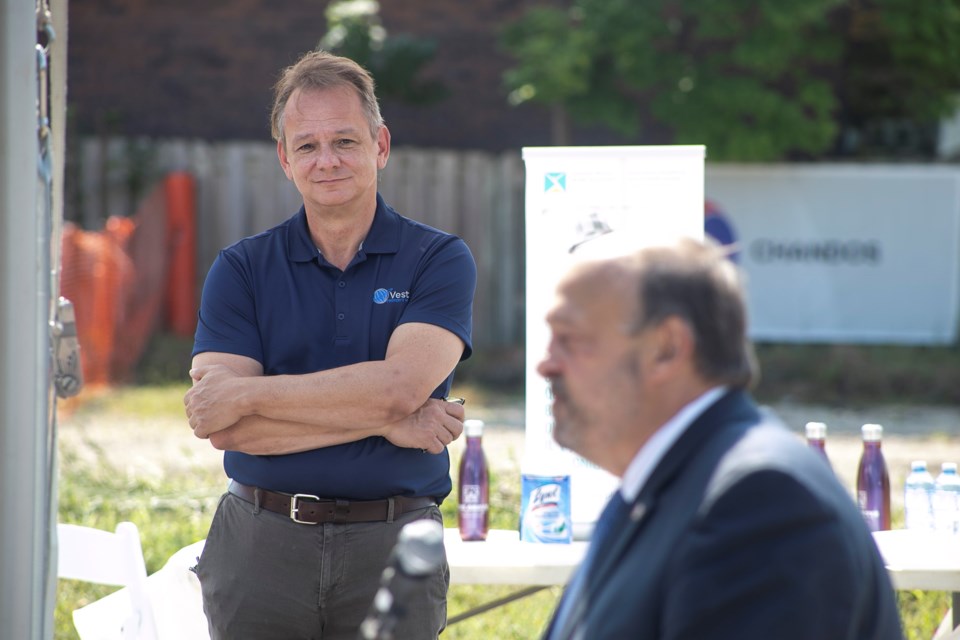A local developer says his $50 million gift of a building to house Canadian Mental Health Association Waterloo Wellington’s youth services is maybe an extreme example of giving back, but it’s his way of saying thanks to those who helped him through his own challenges with mental health and addictions.
Ground broke on Thursday for a new 60,000 square foot Centre for Children’s Mental Health and Development Services that will house a youth mental health hub in Guelph’s north end.
Helen Fishburn, executive director of Canadian Mental Health Association Waterloo Wellington, made the surprise announcement at Thursday’s groundbreaking that the $50 million building is being donated by the developer Vesterra Group of Companies.
Vesterra’s original plan for the plot of land, which once was home to the McDonald’s on Woolwich Street, was for two residential towers. That plan was scrapped entirely when CMHA WW contacted the developer to ask if it would consider including room for its services, said Vesterra president Robert Eilers.
The project with CMHA WW was initially agreed to be a 20-year lease of the property but about a year ago Eilers decided to donate the building entirely.
“I don’t even know how it came up,” said Eilers. “They didn’t ask. Let’s just say we began building very close bonds during this project.”
Eilers said at the age of 17 he was living on the streets and abusing drugs before someone put him on another path.
“They gave me my first place, they got me into therapy and they got me into rehab and all of the things that created the foundation of my future. They even helped me to get my first job,” he said. “I am just one of the lucky ones and this is my way of giving back.”
Eilers said he is hoping to inspire others in the community to give back.
“This pandemic has shown us what really matters — it’s not our business card or our cars or titles or houses. It’s humanity and it’s what we do for our fellow man,” he said.
Fishburn said even a year later she has problems putting into words what the gift means. It is thought to be the largest single donation ever made to community mental health in Canada.
“The act of that generosity is staggering,” said Fishburn. “It’s absolutely incredible.”
She said the donation will allow CMHA WW to take the money it would have put into the lease right back into services.
“It’s absolutely huge. The rent costs alone — which would have come out of our budget — those are funds we can now put right back into care,” said Fishburn.
Once completed in 2023, the building will house 52,000 square feet for 30 service providers offering a range of services for youth and 8,000 square feet of the main floor will be dedicated to Integrated Youth Services Network (IYSN) and its youth mental health hub named The Grove.
The idea for the hub began in 2018 through an initiative by Rotary Club of Guelph, said Cyndy Moffat Forsyth, director of IYSN and The Grove.
“We educated our community, we brought our service providers together to see if there was an appetite to work together — there was,” said Moffat Forsyth.
The Rotary Club of Guelph Charitable Foundation has stepped up with a sizeable donation to The Grove and will have naming rights for that portion of the building.
Fishburn said Rotary Club of Guelph has been the driving force behind the youth hubs.
The Ontario government and Wellington County has put forth $1 million in funding to The Grove projects in Guelph and across the county.
Michael Tibollo, Ontario’s associate minister of Mental Health and Addictions was on hand for the groundbreaking, as were Cam Guthrie, mayor of Guelph, MP Lloyd Longfield and MPPs Mike Schreiner and Ted Arnott.
The idea began small but snowballed to the point where The Grove youth hubs are now open in Erin, Palmerston and Fergus, with future sites at U of G, YMCA of Three Rivers, Shelldale Family Gateway and eventually at the Woolwich Street site.
The way the project has come together since its August 2018 beginning and the generosity of the community really speaks to the need for the service, said Moffat Forsyth. The need has only gotten greater during the pandemic.
“We knew we were in trouble then and now we are in crisis,” said Moffat Forsyth.
CMHA WW statistics show four out of five local youth are struggling with mental health since the start of the pandemic, which it attributes to isolation and uncertainty.
Eilers said he doesn’t want recognition for the donation. He believes the real heavy lifting is being done by those providing the mental health and addiction services in the community.
“They put their heart and their soul into their jobs and it’s hard to deal with people who are having mental health issues, who have drug addiction. It tires you out emotionally and they do it, often for very little pay, and they dedicate their lives to it. They are the heroes. They deserve the thanks. Not me, I am just enabling them,” he said.
Eilers said he is proud of the struggles he went through as a youth because they made him a stronger person and turned him into the man he is today.
“If that 17-year-old kid who was homeless and was abusing drugs and had mental health issues can one day come back and build a building like this and donate it to an organization like CMHA to say thank you and help the do the same for someone else that they did for me — what more could I want?” he said.
